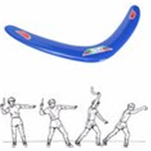
Boomerang children who return to live with their parents after university can be good for families, leading to closer, more supportive relationships and increased contact between the generations, a study has found.
The findings contradict research published earlier this year showing that returning adult children
trigger a significant decline in their parents" quality of life and wellbeing.
The young adults taking part in the study were "more positive than might have been expected" about moving back home - the shame is reduced as so many of their peers are in the same position, and they acknowledged the benefits of their parents" financial and emotional support. Daughters were happier than sons, often slipping back easily into teenage patterns of behaviour, the study found.
Parents on the whole were more uncertain, expressing concern about the likely duration of the arrangement and how to manage it. But they acknowledged that things were different for graduates today, who leave university with huge debts and fewer job opportunities.
The families featured in the study were middle-class and tended to view the achievement of adult independence for their children as a "family project". Parents accepted that their children required support as university students and then as graduates returning home, as they tried to find jobs paying enough to enable them to move out and get on the housing ladder.
"However," the study says, "day-to-day tensions about the prospects of achieving different dimensions of independence, which in a few extreme cases came close to conflict, characterised the experience of a majority of parents and a little over half the graduates".
Areas of disagreement included chores, money and social life. While parents were keen to help, they also wanted different relationships from those they had with their own parents, and continuing to support their adult children allowed them to remain close.
What is the finding of the previous research? ______
A. Boomerang children made their parents happier.
B. The parents were looking forward to their children's return.
C. The parents" quality of life became worse than before.
D. Boomerang children never did any housework.
The underlined word "trigger" in Paragraph 2 may be best replaced by ______ .
A. cause
B. defeat
C. arise
D. allow
What is the attitude of the college graduates towards returning home? ______
A. They are ashamed of turning to their parents for help.
B. They are glad that they could come back.
C. They are doubtful about whether they should return.
D. They are proud to be independent from the family.
What can be inferred as the reason for the "boomerang children" phenomenon? ______
A. The children want to keep in closer touch with their parents.
B. The parents are willing to provide support to their children.
C. It is harder for the children to secure a satisfying job.
D. There is more house work needed to be done by the children.
 Boomerang children who return to live with their parents after university can be good for families, leading to closer, more supportive relationships and increased contact between the generations, a study has found.
Boomerang children who return to live with their parents after university can be good for families, leading to closer, more supportive relationships and increased contact between the generations, a study has found.